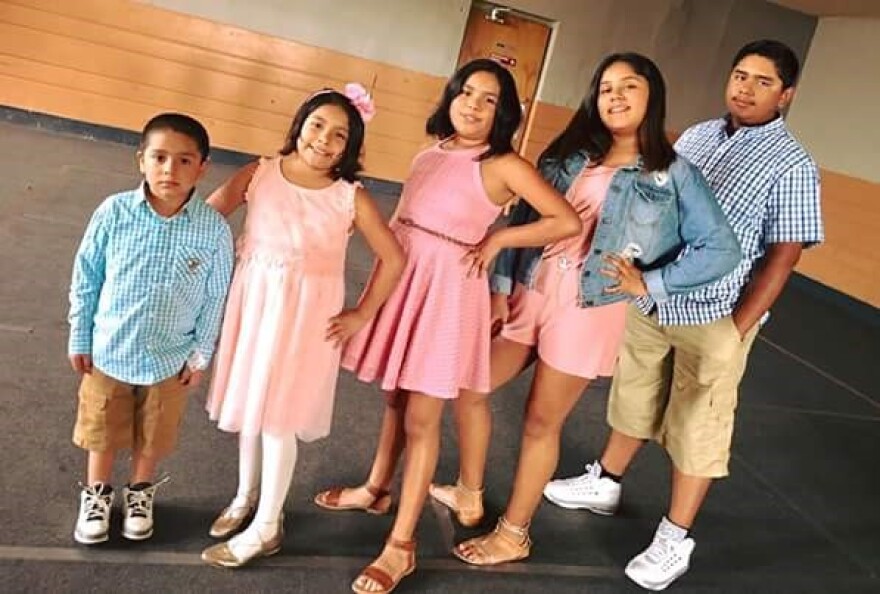Gaby Carmona is a client advocate for a nonprofit, a mother of five, a wife, an active community and church member and a Clay County resident.
All those aspects of Carmona's life are now jeopardized because she is also a Deferred Action for Childhood Arrivals recipient. The documentation that has become so essential to the wellbeing of her family is expiring.
“I’m experiencing all these different emotions. I’m feeling this sense of loss. I’m also grieving the fact that I’m losing something very vital and, gosh, it’s scary,” the 30 year old said.
With the chance of being deported, losing her full-time job and becoming separated from her family in a year and a half, Carmona shared her story to put a face on one of the 800,000 fates in the air.
“My voice is what I have to fight this. This is all I have right now.”

Carmona has lived in the United States for more than 20 years, since she was 7. Previously, her financially-struggling family made trips back and forth from Mexico to the states a few times each year in order for her to be fitted for a prosthetic arm. Ultimately, they decided to overstay their visas.
“We can’t blame our parents,” Carmona said. “They were trying to provide a better future for us.”
Growing up in Wyandotte County, Carmona felt shut out by her inability to communicate with her peers and teachers. Those who remember her from middle school recall a meek girl who was too shy to raise her hand.
“I wasn’t quiet. I just didn’t know the language.”
In high school, Carmona became much more fluent in English and comfortable in the school environment. Surrounded by peers, she became excited about college during her junior year and envisioned what the future could hold as application packages came in the mail.
“And then, coming to the realization that I was undocumented, it was difficult,” she said. “We didn’t really talk about it, but I knew that our passports had expired years before.”
Later that year, Carmona became pregnant with her first child. Despite becoming a teen mom and her ineligibility for higher education, she was determined to make it through and earn her diploma.
She and her boyfriend married and Carmona took on the role of a stay-at-home mom.
“I was never just at home, though. I was very active. I’ve always been very active in the community volunteering multiple places, volunteering at church.”

Head Start is one of the places where Carmona volunteered. There she gained work and community experience by sitting on different boards. Her time spent with other children, families and their unique situations lead to her interest in the nonprofit sector.
Once DACA was put into place the summer of 2012, Carmona sent her completed application the very next day and was approved that November.
She began her career in nonprofits in her 20s, going from a part-time family coordinator to a full-time client advocate at Synergy Services, a network of integrated programs that provide support for families and youth in crisis.
“I sat down with my supervisor just a few days ago, and I told her, ‘Hey my documentation will expire November of 2018. If nothing changes, I will be submitting my resignation letter in October of 2018. This is very possible, but I just want to be upfront with you and tell you.’ It’s going to be extremely hard to draft a letter of resignation for a job I love and enjoy. We support our clients in so many aspects of their lives. I learn so much from them. They’re so essential to my life and give me a sense of purpose.”
Carmona and her husband, who is also undocumented, are now in the process of signing powers of attorney. Those will give her mother and one of her supervisors the authority to act in their place as guardians of their five children should they be deported.
It’s been hardest on her 13-year-old and 12-year-old children, she said. At school, kids tease them and tell them their parents will be going back to Mexico.
It’s been a tumultuous past month with, often times, conflicting statements from the Trump administration and politicians about the fate of DACA, but Carmona said she can’t focus on what she has no control over.
Instead, Carmona and her husband will continue to work multiple jobs to set aside money for their five children, and she will continue speaking out.
“It’s very important for me to share my story. I think that’s the only thing that empowers me to keep on moving,” she said. “I feel like educating other people about what this is. What the administration has done is it has dehumanized DACA, but when you put a face and name to a story, I feel like that can change the outlook. And maybe, just maybe, that can change someone’s perspective about immigration.”
Claire Tadokoro is a UMKC student and former Up To Date intern.



